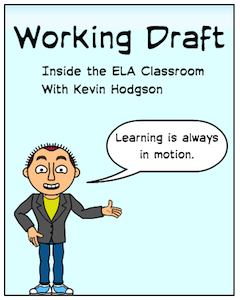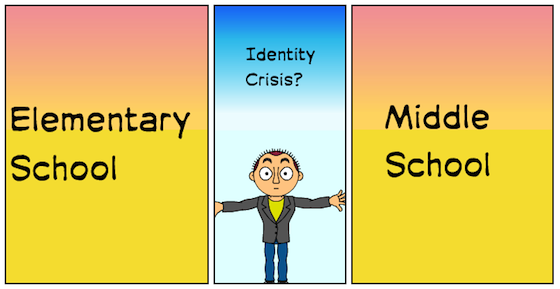6th Grade Identity Crisis
A MiddleWeb Blog
I often feel like a middle school teacher in an elementary teacher’s body. Or maybe it is the other way around — feeling like an elementary teacher with a middle school mindset.
You see, in our school district, our sixth grade is still part of the elementary school. At the end of the day, at the bus loop, seeing our tall sixth graders interacting with kindergarteners is worthy of a smile.
Officially, the middle school concept doesn’t start until our sixth graders make their way to a regional school, which is home to grades seven through 12. Who knows what my colleagues over there in the middle school wing feel like, but I imagine they could relate to the confusion my team has at times.
Just like adolescent kids, we sixth grade teachers often wonder: where do we fit in?
~ Listen to a podcast of Kevin’s blog post ~
In our elementary school, the sixth grade is like another world. Not just because the kids are larger (although they are, for the most part) but because we call ourselves a “Middle School Model” in which each of the four of us, plus our special education team, have become specialized in one of the four content-area fields: Science, Math, Social Studies, or in my case, English Language Arts. Plus, I tuck technology and digital literacies under my hat, if only to expand our definitions of literacy in this age.
Our teaching counterparts at the three other elementary schools in our district may not harbor the same confusions about teaching identity. Unlike our school (with more than 500 students, the largest elementary school in our district), their schools are relatively small, just one class per grade level, and they work in self-contained learning environments, just as many elementary teachers do.
This makes for tricky professional development when we all come together, since I may find math interesting and science fascinating and history intriguing, but I am always focusing in reading, writing, speaking and listening. The math teacher on my team must roll his eyes when we spend an entire day on ELA matters.
Common coring
The Common Core focus of our district has us alternating between ELA and Math curriculum development on a regular basis, shifting from leading role to supportive roles, depending on our areas of curriculum expertise. Our science and social studies teachers join in, too, particularly as we do more work around cross-curricular connections.
Speaking of the Common Core, have you noticed how the grade bands also put sixth grade in the middle school? There we are, grades six through eight, lumped together. And don’t get me started on the Scholastic Book orders. Suddenly, this year, as they move towards more grade specific book orders, the sixth grade … is part of the middle school reading groups.
 Good COPS, bad COPs
Good COPS, bad COPs
When our school began a Communities of Practice (COP) initiative a few years ago, this sense of “being different” from the rest of the grades in our school became even more apparent, as teachers in COP time shared out best practices, so they could learn from each other. That didn’t work for us as much. I teach ELA to ALL our sixth graders. My teammates teach their subjects to ALL the sixth graders. And, we often have limited, if any, contact with our seventh and eighth grade colleagues at the regional school during the year. This is more geographic than purposeful distance, but still .. it gives us a sense of isolation from the middle school identity.
I realize, however, that over the years my colleagues and I have found ways to navigate this identity crisis. We highlight the ways we reach all students, share best practice strategies in our COP that cross over disciplines, nurture students with strengths and weaknesses in one area but not another; and establish a formidable learning partnership with teachers in the earlier grades that thrives even in the face of not quite fitting in.
We are square pegs approaching round holes on many days and that’s OK.






































I am living in the same world you are. 6th grade has always been in a different world, depending on whether or not it is housed in a middle school or an elementary school. However, it has become even trickier for those of us who teach 6th grade in an elementary school because of the Common Core and it’s definitive shift of moving 6th grade to middle school. Not only do we not know where we fit in there, but where do we fit with our education licenses? (I have an elementary license, but Common Core says 6th grade is middle school.) Thank you for sharing this. It is nice to know my colleagues and I aren’t the only one!
I also teach at a elementary school in Pennsylvania. I’m a language arts mistress primarily. In our school district sixth graders are educated at middle schools. I’m not sure if other districts do the same thing as us. This is a district problem. I love your blog. Which school district do you work for? Which school do you work at?
Kevin Hodgson blogged for MiddleWeb from 2013 to mid-2018. This was one of his first posts. He continues to teach sixth grade at a K-6 school in Massachusetts. Thanks for asking!
Hi Leah
Thanks for reading and responding. I find sixth grade remains that strange space between worlds, as if school planners and administrators are never quite sure where we go.
Kevin
i am unfortunately like your colleagues; I teach a self-contained 6th grade class. I love my students. Sometimes I get a little frustrated with the process… but we move on. at least I do for my students.